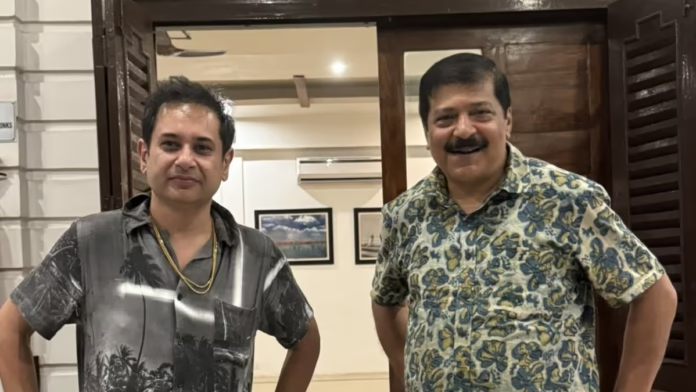Tripura, senior Congress leader and MLA Sudip Roy Barman on Thursday claimed that many leaders in the Bharatiya Janata Party (BJP), including Tipra Motha founder Pradyot Kishore Manikya Debbarma, still carry what he described as the “Congress DNA.” The remarks were made during a press interaction in Agartala, where Barman took a swipe at the ideological roots and political transformations of key figures now outside the Congress party.
The Congress MLA and former minister did not hold back in pointing out what he sees as the deep-rooted influence of Congress ideology among leaders who have shifted camps over the years. According to Barman, many of those who currently occupy prominent positions in the ruling BJP, both at the state and regional level, once began their political careers in the Congress party. Their style of functioning, language of public engagement, and even policy inclinations reflect their original political background, he asserted.
Referring to Pradyot Kishore Manikya Debbarma, the royal scion and founder of the Tipra Motha party, Barman said that despite leading a regional tribal-based political outfit, Pradyot’s core values and political approach are still aligned with the Congress school of thought. He argued that Pradyot’s consistent focus on inclusive development, rights for the indigenous population, and democratic values is a clear indicator of his ideological upbringing within the Congress.
Barman’s comments come at a time when the political landscape in Tripura remains fluid, with alliances, breakaways, and shifting loyalties becoming increasingly common. He suggested that the outer appearances of party affiliations may have changed for some leaders, but their foundational ideology continues to be rooted in the Congress legacy. He cited examples of welfare-driven governance approaches, political speeches, and public connect strategies that, in his view, mirror the Congress brand of politics.
The statement has drawn attention not only because of its political tone but also due to the timing, as Tripura gears up for upcoming local body elections and increasing public scrutiny of the current government’s performance. Barman hinted that many in the BJP-led administration, despite being in a different party today, are still guided by Congress values, particularly when it comes to public welfare and socio-political outreach.
Sudip Roy Barman, known for his outspoken political commentary, also used the occasion to criticize the BJP for what he described as abandoning core democratic practices in favor of centralized decision-making. He urged voters and the public at large to examine the true nature of their leaders beyond party labels, emphasizing that the Congress remains the only party with a history of truly inclusive governance.
Political observers in Tripura believe that Barman’s remarks are aimed at rekindling support for the Congress, especially among voters who feel disillusioned by the current political equations. The idea of “Congress DNA” serves as both a nostalgic reminder of past leadership and a strategic positioning tool ahead of the polls. Analysts say that his comments could also open doors for dialogue between Congress and certain factions within Tipra Motha or disenchanted BJP leaders.
Meanwhile, reactions from the BJP and Tipra Motha leadership remained cautious. While no direct responses were issued at the time of writing, party insiders have acknowledged that the comments have sparked internal discussions. In Tripura’s competitive political climate, where alliances are often redrawn with little warning, Barman’s statement could influence not just public perception but also behind-the-scenes negotiations in the months to come.
As political momentum builds in the state, Sudip Roy Barman’s assertion about the lingering presence of “Congress DNA” in rival camps serves as a provocative reminder of the complex and intertwined history of Tripura’s political leadership. The Congress appears poised to use that history as a tool for revival and re-engagement with the electorate.
Sudip Roy Barman also addressed the current challenges facing the Congress party in Tripura, acknowledging that while the party may not hold numerical strength in the Assembly, it retains significant ideological influence across the political spectrum. He claimed that the values of social justice, secularism, and welfare-oriented governance—hallmarks of the Congress legacy—continue to inspire even those who have left the party for political convenience.
He took the opportunity to remind the public of Congress’s historical contributions to Tripura’s development, especially during times when tribal welfare, healthcare, and education were prioritized under its rule. Barman emphasized that leaders now in rival parties benefited from Congress’s leadership environment, learning the ropes of governance and public engagement under its banner before seeking opportunities elsewhere.
Drawing attention to the growing discontent among sections of the public, he said people were now beginning to question whether the promises made by the current government have been fulfilled. He urged citizens to reflect on the shift in governance quality and the widening gap between promises and delivery, asserting that only a Congress-led government can restore public confidence and ensure balanced development.
Barman also made a veiled reference to future political alignments, stating that ideological closeness could play a crucial role in reshaping Tripura’s political alliances. While he stopped short of openly inviting any leader to rejoin Congress, his remarks hinted at potential openings for rapprochement, especially with leaders disillusioned with the current dispensation.

